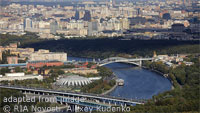American witness: Blogging Russian life

(Moscow News – themoscownews.com – Nathan Gray – July 29, 2013) For Oklahoma native Jennifer Eremeeva, what started as a childhood fascination turned her into a guide of Russian life.
Eremeeva’s settlement in Moscow began in 1993 in a rather exotic location, an apartment she shared with her future husband in the neighborhood of Butovo, beyond today’s Moscow Ring Road.
“It is a ways out,” she said. “One-room flat, no telephone, no metro, so it was pretty ‘walk on the wild side.'”
Now a food and humor writer, she is surprised to think that she has been living in Russia for two decades. Even at that point, however, she had already had plenty of experience with the country, frequently traveling here as a tour guide.
Imperial glamour
Eremeeva was born in Oklahoma in 1966, but her family moved to western Massachusetts when she was five.
Her interest in Russia, she is somewhat embarrassed to admit, came about at the age of 13, when she read “Nicholas and Alexandra” by Robert K. Massie.
“Russia seemed so far away and so big and so secretive and so mysterious, and the whole Revolution seemed so evil,” she said. “As I studied history I began to see things in a little more balanced way, but when I was a teenager, I was very much caught up in the glamour of imperial Russia.”
The incentive to channel her interest into formal academic study was strong. Her education at Columbia University came at a time when interest in the Soviet Union was rising again in the United States, with Mikhail Gorbachev tipped to become the next leader at the time Eremeeva was applying to colleges in 1984.
Old habits
After graduating in 1989, she continued her work in tourism, which she enjoyed a great deal, even if working in the Soviet Union had its peculiarities – such as a lack of individual travel.
“Everything had to be done by a group,” she said. “We did this very standard [package]: seven days, six nights, overnight train from Moscow to St. Petersburg… If you wanted something else, it was very complicated.”
The differences between then and now are encapsulated in the business of Eremeeva’s former company, General Tours.
“Now their model has flipped,” she said. “They probably do 80 percent of their business with individual travelers, and the groups are smaller.”
Still, old ways of thinking die hard, and even when she is hosting friends, she finds herself forgetting how things have changed.
“I just had a friend come and stay for two weeks in March, and I thought I had to be with her every single minute of the day, but she was fine,” Eremeeva said. “She had a guidebook, the street signs were in English, she knew what she wanted to see, she had researched it all on the Internet… and I was really conscious of how much easier it’s become.”
Learning the ropes
Other major changes Eremeeva has seen from the inside were in investment banking, when she started work in public relations with United Financial Group in 2003, three years before its sale to Deutsche Bank.
“They wanted a PR strategy that was a little bit more Western than what they had in place,” she said. “I said, ‘I have absolutely no idea about what you do,’ and it was fine, because it was actually a good opportunity to learn all about the financial markets.”
She credits her time at UFG with giving her a “more dynamic and responsible” attitude toward personal finance, but also a good seat for exciting developments on the Russian market: the first IPOs starting up, the boom in the oil industry – including the then-momentous TNK/BP merger – and the growing popularity of asset management.
A life in letters
Perhaps the biggest shift in Eremeeva’s career came after the bank’s sale in 2006. For the first time since she was 16, she gave up formal employment to write a book, which she expected to complete in one year.
Writing and publishing is not that simple, however, and while she admits that things did not go as she had planned, she is happy that they didn’t.
“I met some people who were working at Russia Beyond the Headlines, who gave me an opportunity to write two different kinds of columns: one was about food, and one was about humorous stuff,” she said. “That honed the voice that I had been looking for in both directions.”
Her writing – including the blogs Russia Lite and The Moscovore – comes down to giving people access to Russian life, and not just what they hear on the news.
“I really enjoy showing people things and making Russia accessible,” she said.
Expanding horizons
Walking tours are a major part of her work, and as a food writer, two of her destinations are the Danilovsky and Dorogomilovsky food markets.
“Newcomers are delighted when they learn that this is here, because they’re not seeing this in their local supermarket, particularly if they live in certain expat enclaves,” she said, walking through the Danilovsky market.
Still, she laments the loss of many produce and food kiosks, as well as a major market near Tsvetnoi Bulvar.
“I think it was a shame to close what was really the foremost market in the middle of Moscow, a city of 12 million people,” she said.
For people farther afield, Eremeeva is hoping that her book – to be published in the fall, just ahead of the Olympics – will help open up a different perspective on Russia, which brings her back to the travel industry: the visa regime is not only constricting the tourism market, but also limiting people’s perceptions about the country.
“Outside of Russia, perceptions about Russia are very skewed, and I think it takes a visit here to understand how sophisticated the market is,” she said. “Russia should make that available to as many people as possible to change the perception.”
